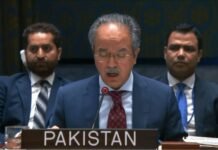Geneva, 2 November 2021 (TDI): The 39th session of the Universal Periodic Review Group started on 1 November. The session will end on 12 November, and it reviews the human rights situation in 14 countries. The second session was in Suriname.
COUNTRIES TO BE REVIEWED ON THE 39TH SESSION
Greece, Samoa, Suriname, Hungary, Sudan, Saint Vicent and the Grenadines, Tajikistan, Papua New Guinea are in the first week’s discussions. The first week also includes Tanzania. In the second week, the group will discuss Eswatini, Antigua, Barbuda, Trinidad and Tobago, Thailand, and also Ireland.
ACTIONS OF SURINAME
In the review of Suriname, the Minister of Justice and Police, Kenneth Amoksi; released a statement. Amoksi said that Suriname ratified the Convention on the rights of persons with disabilities, and also the ILO Equal Remuneration Convention. Amoksi also remarked that Suriname ratified the ILO Discrimination (Employment and Occupation) Convention.

Amoksi then added several achievements of Suriname. The first one is that Suriname made healthcare free and that the government built new schools. Then Amoksi mentioned that Suriname developed a fiscal crisis recovery plan.
Also, Amoksi remarked that the government took steps to establish a National Human Rights Institute. Other actions that Amoski mentioned are the government’s actions to improve conditions at the prisons and tackled gender-based violence in the context of COVID.
COMMENDATION OF OTHER STATES
The other states commended Suriname for their actions, and also for taking measures for the abolition of the death penalty. In their review session, the states made multiple recommendations.
RECOMMENDATIONS OF THE STATES
The first one is that Suriname should establish a national human rights institution following the Paris principles. Then they recommended Suriname ratify the Convention against Torture and abolish the death penalty.
RECOMMENDATIONS FOR GENDER VIOLENCE
Recommendations of the States on gender issues were to continue to address all forms of violence against women, and girls; also to address maternal mortality. Then to ratify the Second Optional Protocol to the Covenant on Civil and Political Rights.
The States recommended also enacting legislation to prohibit discrimination based on gender identity and to improve the protection of women. The States urged Suriname to ratify the Convention on enforced disappearances.
RECOMMENDATIONS ON HEALTHCARE, EDUCATION, AND CHILDREN
The other States recommended that Suriname adopts the optional Protocol to the Convention on the Elimination of All Forms of Discrimination Against Women. Another recommendation was to improve access to education.
It was also suggested to ratify the UNESCO convention on discrimination in education. The promotion of inclusive education for children with disabilities, the adoption of measures to combat child poverty and labor; and guaranteeing access to healthcare were also recommended.
RECOMMENDATIONS ON SECURITY AND CLIMATE ADAPTATION
First, the States recommended aside from the already mentioned proposals, to ban the practice of corporal punishments. Then to adopt the judgments of the Inter-American Court of Human Rights.
Lastly, to strengthen the fight against Human Trafficking. In Climate, the states recommended adopting an inclusive and participative approach to climate adaptation.
BACKGROUND OF UPR AND ADOPTION OF THE REPORT
The base of the UPR is the HRC resolution 5/1, in conjunction with HRC resolution 16/21. This says that the Group will hold three sessions of two weeks per year, to review 42 countries per year.
In this way, the group reviews the 193 countries, by the end of each UPR cycle. Each review is facilitated by groups of three states, who act as rapporteurs. The Working Group is set to adopt the report on Friday, November 5.
International Relations student at the Universidad de Navarra in Spain. Main interests are the work of International Organizations like the UN in the scope of humanitarian assistance to vulnerable human beings and the environment








